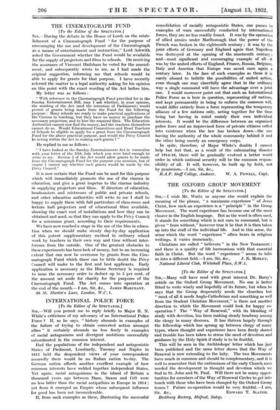INTERNATIONAL POLICE FORCE
[To the Editor of the SPECTATOR.] SIR,—Will you permit me to reply briefly to Major R. N. White's criticisms of my advocacy of an International Police Force ? If, as he says, " history abounds in examples of the failure of trying to obtain concerted action amongst allies " it certainly abounds no less freely in examples of racial antagonisms and divergent ambitions successfully subordinated in the common interest.
Had the populations of the independent and antagonistic States of Piedmont, Lombardy, Tuscany and Naples in 1815 held the despondent views of your correspondent assuredly there would be no Italian nation to-day. The German nation affords another excellent example of how common interests have welded together independent States. Yet again, racial antagonisms in the island of Britain a thousand years ago between Dane, Saxon and Celt were no less bitter than the racial antipathies in Europe in 1914 ; yet from it emerged an Empire whose subsequent influence for good has been not inconsiderable.
If, from such examples as these, illustrating the successful
consolidation of racially antagonistic States, one passes to examples of wars successfully conducted by international forces, they are no less readily found. It was by the operation of allied armies under Marlborough that the power of the French was broken in the eighteenth century ; it was by the joint efforts of Germany and England again that Napoleon was destroyed at the opening of the nineteenth century ; and—most significant and encouraging example of all—it was by the united efforts of England, France, Russia, Belgium, Italy and America that Europe was saved once again a century later. In the face of such examples as these it is surely absurd to belittle the possibilities of united action, even though one may cheerfully agree that in the ordinary way a single command will have the advantage over a joint one. I would moreover point out that such an International Police Force as is here in question, representing all nations, and kept permanently in being to enforce the common will, would differ entirely from a force representing the ;temporary alliance of a few nations only, acting together for the time being but having in mind mainly their own individual interests. It would be the difference between an organized police force and an improvised force of private citizens called into existence when the law has broken down—the one having the authority of the whole community behind it and the other being merely an emergency corps.
In spite, therefore, of Major White's doubts I cannot help but feel that, as a result of the culminating disaster of 1914-18, there will be gradually evolved a better world order in which national security will be the common respon- sibility of all. It will, however, be built up by faith, not by pessimism.—I am, Sir, &c.,
R.A.F. Staff College, Andover. W. A. PowELL, Capt.






























 Previous page
Previous page